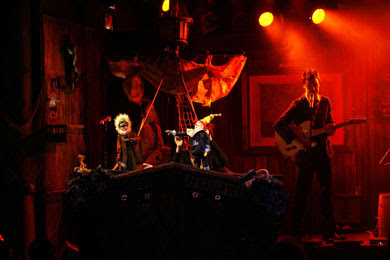BASH'd: A Gay Rap Opera
 Here's a straight opinion of BASH'd: A Gay Rap Opera--there has got to be a better, funnier way to reclaim the word "faggot." Visually pared down (but full of sight gags), the show comes across as a cross between Altar Boyz and Xanadu (without the sharpness of either), and sounds as if it's performed by a white R. Kelly (and he knows a thing or two about repetitive hip-hoperas). The show opens with a comparison to Romeo and Juliet's "star-crossed lovers," and devolves from there to an uneven gloss of how country boy Dillon (Nathan Cuckow) wound up with city boy Jack (Chris Craddock), and how violence caused one of them to fight back. The show is already lighter than air, so after it jumps the shark, it doesn't come back down: there's a Bonnie and Clyde-like twist and that's not the deus ex machina.
Here's a straight opinion of BASH'd: A Gay Rap Opera--there has got to be a better, funnier way to reclaim the word "faggot." Visually pared down (but full of sight gags), the show comes across as a cross between Altar Boyz and Xanadu (without the sharpness of either), and sounds as if it's performed by a white R. Kelly (and he knows a thing or two about repetitive hip-hoperas). The show opens with a comparison to Romeo and Juliet's "star-crossed lovers," and devolves from there to an uneven gloss of how country boy Dillon (Nathan Cuckow) wound up with city boy Jack (Chris Craddock), and how violence caused one of them to fight back. The show is already lighter than air, so after it jumps the shark, it doesn't come back down: there's a Bonnie and Clyde-like twist and that's not the deus ex machina.
"T-Bag" (Craddock) is a talented vocalist: he justifies the humor of hip-hop by being faster, louder, and angrier than his partner, "Feminem" (Cuckow). But as Eminem's Encore showed, skill is meaningless without heart. Hence, BASH'd is clever with its lists--one song spoofs the average gay bar (chickhawks to fag hags; twinks, lesbians, and bears, oh my), another aims to culture us in gay musical icons ("What about Cher?"/"Oh, my shrine's over there."). But simply rapping doesn't reverse the stereotypes of a notoriously intolerant genre; the show comes across as an unfocused assemblage of bad jokes that Craddock and Cuckow seemed to be hoping would be "transformed" into something deeper by the satire.
BASH'd is most effective as its bluntest, with a long recitation of hate crime victims. But it's hard to get real in the midst of parody ("All you real faggots pump your wrists in the air/It's OK to be gay, really out and aware"): while Cuckow and Craddock are positioned well for a comic routine that recasts Eminem's "Cleaning Out My Closet" as "Coming Out The Closet," they're missing the otherwise inexpressible emotions that make rap worthwhile in the first place. "Smash, Boom, Crash," a first-person account from the receiving end of a gay bash, comes across as a grotesque: Aaron Macri's music allows us to keep a distance from the true pain behind it. The truth is, it's hard to be tongue-and-cheek with rap unless your cheek's as fast as your tongue.
















